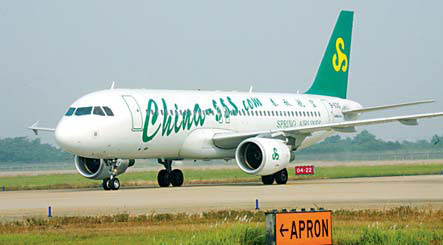


Hit by the global financial crisis, the Chinese government last week asked airlines to suspend purchase of new planes or delay the delivery of already ordered planes to cut operation costs and maintain a balance between demand and supply.
As the aviation industry softens amid the global economic turmoil, China's private airlines have found themselves subject to a much more difficult situation with tighter capital flow and the difficulty in getting enough loans.
China's first private airline Okay Airways suspended passenger services on December 6 because of financial and management problems. It said it could not refuel its aircraft in the wake of an internal management dispute with its largest stakeholder Juneyao Group.
In another episode, Sichuan-based private carrier United Eagle Airlines grounded two jets at the end of last month due to mounting financial woes. It has not been paying airport fees since February 2007 according to earlier media reports.
These problems are raising concern whether private airlines in China would be able to weather the challenges in the current market gloom, as they are much more vulnerable to market fluctuations than State-owned competitors without government support.
But Zhang Lei, spokesman of Spring, expresses confidence in the private carrier's budget model as cost controls are becoming increasingly important.
"While private airlines are prone to setbacks in difficult times, they might as well create a niche market by addressing the needs of a particular group of customers. It is therefore up to them to find a way out of this difficult position, though government aid like preferential tax policies or the facilitation of loans is welcome at a time of tighter liquidity.
"At Spring, we believe budget airlines are indispensable to China's aviation industry given the current economic status of the country. People here still regard saving costs the top priority," Zhang says.
Xia Fulu, analyst from Industrial Securities, agrees that cost controls would remain as the single most important factor in sustaining private airlines through the present dilemma. "When the market rebounds, there might be new opportunities to pump their growth," he says.
But he also expresses concern that private airlines might be subject to a "massive restructuring" within the current market dive.
Whatever the challenge is, Spring Airlines Founder Wang Zhenghua remains largely unperturbed. The man does not need to be asked what he is concerned with. He wears his heart on his sleeve.
"I believe it is everyone's wish to know what it feels like traveling in the air. Air travel should not be a privilege enjoyed by the rich. Just like the low-rent apartments we are rolling out to assist low-income families, low-cost air travel should also be made accessible to all."
He follows his explanation with a story he learns from a friend, who regrets that he is unable to help his old father fulfill his dream of ever stepping into an aircraft. As a farmer, the father is not willing to take an air trip costing him 1,000 yuan, which is enough to sustain his living for a whole year.
Stories like that keep on reminding Wang of the significance of promoting budget airlines in China, and he is sincere and earnest in seriously trying everything he can to change that situation.
Even at age 64, he still spends most of his time at work, thinking about how to make Spring stronger. He says the priority would be to expand the fleet. In the next five years, Spring is to bring in an additional 14 aircraft that requires 6 billion yuan investment in all.
With an IPO plan being postponed amid the current worldwide economic uncertainties - Wang had planned to list the carrier in 2009, he is now considering borrowing money from banks to help fuel the company's growth. In fact, many foreign banks and financial institutions have been more than eager lately with their sweetened offers to invest in Spring at a time when Chinese national carriers are reeling from huge losses.
But Wang is concerned for the industry in general. Even without the financial crisis, he says, China's aviation industry was already heading into overcapacity. In 2004 there were only 600 aircraft, but now there are more than 1,200. There will be another several hundred to be delivered in the next few years. It is therefore doubtful whether passenger demand could follow that growth.
In recent years, Wang has also become a hot figure for TV channels and newspapers. Such frequent public exposure is to make Spring known to more people, says Wang, and it is his belief that media could play a big role in supporting the development of budget airlines in China. That is why despite his tight schedule, Wang would not mind spending two hours or more explaining to reporters his experiences and ambitions.
All those hard work, however, has come at a cost. All through the year Wang only spends some nights having supper with his family members, because it is impossible for him to get back home in time for dinner.
At 64, the conscientious man is still not ready to let go. He says he would not stop working for Spring until he could not think any more. "But I am well and sound now practicing Tai Chi every day." He chuckles, adding that his confidence in his chosen career will not wither in face of the current difficulties.
"What I am doing right now will prove to be significant in the next 20 years. We will always need to look into the next 20 years in order to decide what to do for now."
(China Daily 12/15/2008 page12)













